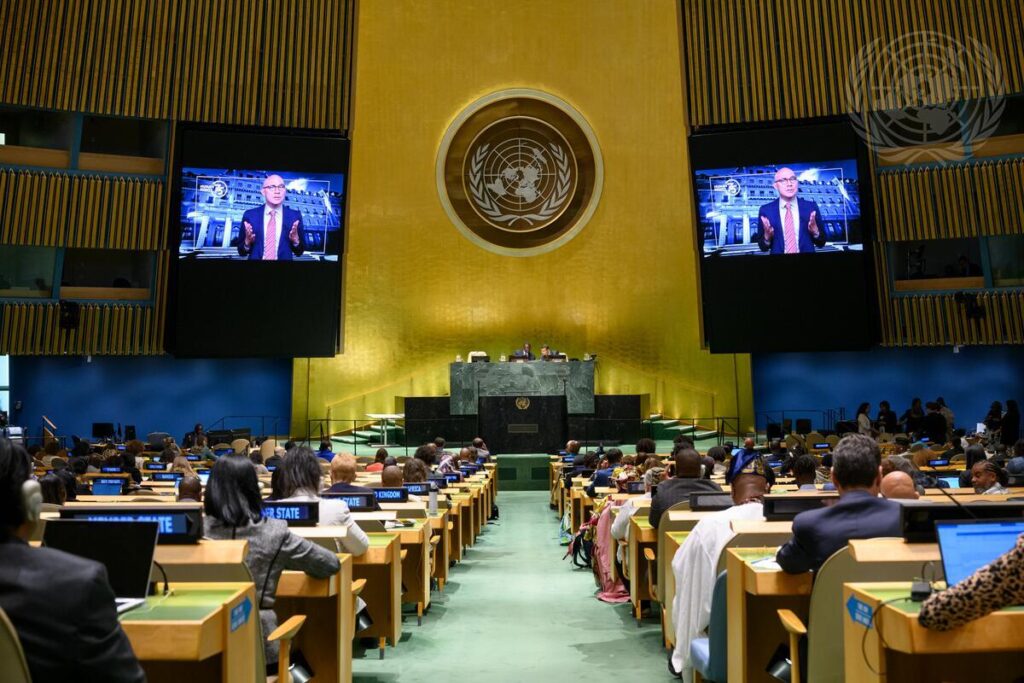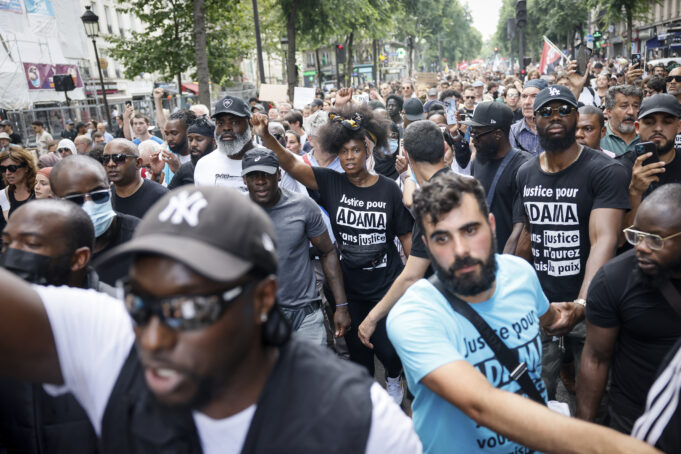A report from the United Nations Human Rights Office said people of African descent continue to face enormous challenges to meaningful participation in public affairs in many countries due to systemic racism, marginalization and exclusion often rooted in the legacies of enslavement and colonialism. The report issued on Sept. 5 details the ill-effecta on all aspects of their lives.
Based on the findings, Volker Türk, the UN High Commissioner for Human Rights, implored countries to step up on efforts towards meaningful, inclusive, and safe participation for people of African descent in every aspect of public affairs.
“Racial abuse and discrimination, surveillance, harassment, intimidation, arrests and violence against people of African descent … hinder meaningful, inclusive and safe participation … in public affairs in many countries,” said Mr. Türk.
The High Commissioner urged states to take targeted action to change the status quo. This includes evidence-based legal, policy, and institutional approaches to dismantle systemic racism, including in law enforcement, as described in a new guidance note for countries on transformative change for racial justice and equality. The right to participate in public affairs without discrimination is a fundamental human right recognized by international law. Implementing this right is crucial for empowering people for self-determination and shaping their own futures, say rights advocates.
A principle of the Office of the UN High Commissioner for Human Rights is for societies to exist where no people are left behind in thriving under the essentials of freedom, justice, and equality.
However, that is the ideal. For people of African descent worldwide, the impact of racism, racial discrimination, xenophobia, and related intolerance continue to impede their quality of life, progress, and equitable engagement in societies. Analysts say the problem will continue unabated if its systemic nature is not acknowledged and reparatory justice is not addressed.
Speaking to journalists in Geneva on Sept. 5, OHCHR spokesperson Ravina Shamdasani said the process of redress needs to be “informed by people of African descent,” with “wide-ranging initiatives, including formal acknowledgment, apologies, truth-telling processes and reparations in various forms. This should be structured through “the effective participation of people of African descent and their communities,” she added.
“The key here is systemic racism,” said Bill Fletcher Jr., the former executive director of TransAfrica Forum. “In order to understand why there’s this continued marginalization and oppression, you can’t look at this as primarily a behavioral problem,” he told The Final Call. “You’ve got to look at it as a systemic problem.”
In addressing a systemic problem, “you have to do more than tell the truth and more than reconcile,” explained Mr. Fletcher. “That’s not enough, you’ve got to rectify the problem,” he stated.
Mr. Fletcher said there is too little discussion about “systemic rectification” resulting in weak reforms and no repair.
In a statement earlier this year, marking the International Day for the Elimination of Racial Discrimination, UN experts stated that unchecked systemic racism and racial discrimination have undermined human rights and gains made in ending enslavement, apartheid, colonial rule, and discriminatory laws and practices.
The report noted that socioeconomic marginalization experienced in housing, employment, health, education, poverty, and access to land, shapes the lives of many people of African descent in different countries. People of African descent also face system-wide, disproportionate, and discriminatory impacts in their encounters with law enforcement and the criminal justice system.
In some countries, the absence of data divided by race or ethnic origin along with issues like denial of identity documentation and minority status reinforces the historical, social, and structural invisibility of people of African descent.
Some nations are falling woefully short in addressing lingering problems of racial discrimination and xenophobia despite available mechanisms for tackling these maladies. Mechanisms like the International Convention on the Elimination of All Forms of Racial Discrimination (ICERD), the Durban Declaration and Program of Action (DDPA), and the International Decade for People of African Descent 2015-2024 were established to guide reparatory efforts. But nations have lacked the political will to take concrete steps to right the wrongs, say advocates and experts.
Until European leaders not only apologize but recognize their exploitation and subjugation of the labor of African people, and the enormous amounts of wealth they accrued over generations of exploitation, “it’s the same game, just a different day,” said Dr. Harry Singleton, professor of African American Studies and Religious Studies at the University of South Carolina.
Dr. Singleton welcomes the report in one sense but maintains the need for caution.

“I’m thankful for them recognizing this reality, that as people of African descent we have recognized for 400 years,” Dr. Singleton told The Final Call. “The reality …it’s yet another instance that reeks of paternalism,” he said.
Dr. Singleton opines it reinforces a notion that people of African descent are pitiable people that have to be helped, rather than free human beings that have to be engaged. So, it still is a manifestation of the European community looking at African people as subjects and not true human beings on the level of Europeans.
It is not unique where laws were created to integrate people of African descent into the nations where they live. But at the same time, there has been very little will to enforce those laws.
Dr. Singleton said in that sense there is marginalization mainly because some European countries went to great lengths to engage in a “public tokenism of African people” to feature a few.
“But has always been slow on the process of mainstreaming the masses of people of African descent into the economic riches of nationalistic and global life,” said Dr. Singleton.
In the U.S. context, he said Black leadership should utilize the report and incorporate into its “lexicon of critique of White supremacy” that even now the UN has outright condemned African marginalization throughout the world. It needs to become part of our case against European colonization and globalization. “That it continues to perpetuate a racial have and have nots, which serves as the handmaiden of an economic have and have nots that we have experienced for over four centuries as people of African descent,” said Dr. Singleton.
The report will be officially presented to the UN Human Rights Council on October 5, during the 78th session of the UN General Assembly.
The report is a document calling for change and is presented at a time of universal change and outcry for justice and fair dealing.
The Honorable Minister Louis Farrakhan along with the Most Honorable Elijah Muhammad, his teacher and Eternal Leader of the Nation of Islam, warned every nation will be judged out of their own book and record.
Minister Farrakhan wrote in his pivotal book, “A Torchlight for America,” that there is “gross dissatisfaction” with leadership and government and the dissatisfaction must bring about a change.
The report shows the same condition exists worldwide.
“The question becomes: Who will bring about the change? Who will offer solutions to the problems faced by the people and what kind of change will there be?” the Minister wrote.
Minister Farrakhan asked the world powers how they will deal with a solution, “a Divine solution,” or “a torchlight,” if it is not carried by someone of their own class, sex, faith, color, party, or nationality.
“How will you deal with a solution when it comes from a source you least expect?” he questioned. “Would you cast the solution aside, or seek to destroy the bearer of the solution? Or would you thank God for giving you an answer to your problems and your prayers?” wrote Minister Farrakhan.
The Bible states, “No man, when he hath lighted a candle, putteth it in a secret place, neither under a bushel, but on a candlestick, that they which come in may see the light.” (Luke 11:33)
The Minister explained the purpose of the wickedly wise to hide the truth is so people won’t see a way out of their present circumstances, and those who rule can continue to dominate and subjugate the people to feed their own lusts and greed.
“I submit to you that this is a dangerous time to play with the people and their earnest desire for liberty. It’s a dangerous time to play with people whose hunger and thirst is for justice and truth,” warned Minister Farrakhan.













